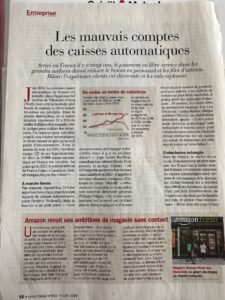
An article in the June 6, 2024 issue of Challenge magazine explains that self-checkouts aren't used as much and aren't as attractive as they used to be. According to the article, some supermarket groups are even going backwards.
I don't entirely agree with this analysis.
The arguments put forward by the journalist are, on the one hand, that self-checkouts don't prevent queues (at self-checkouts) and, on the other, that this method of checkout facilitates theft (known as shrinkage), which undermines the profitability of the machine
When it comes to queuing, there's no contest. At NCR, we had a presentation showing customers waiting at a conventional checkout and the same number of customers waiting at an automatic checkout. This short film easily demonstrated that the queue at automatic checkouts moves much faster than at conventional checkouts. The reasons are as follows. First of all, an automatic checkout cannot accommodate “big carts”. In fact, it is clearly specified at the entrance to each automatic payment zone that baskets must not contain more than twenty items. This is important, because it also speeds up the checkout process. The other reason is that in a self-checkout zone, there are at least four checkouts (but there are usually 4 to 8), which means that 4 to 8 customers can pass through at the same time. The video we had at NCR, or the simulation developed at Wincor Nixdorf (now Diebold Nixdorf), is indisputable: the queue at a self-checkout zone always moves faster than a queue at a conventional checkout.
The article points to the fact that Casino decided to rehire cashiers because self-service stores weren't offering the service customers expected. For me, there's a confusion between checkout and in-store service. In fact, some stores open on Sundays with no staff other than security guards. That's not the ideal customer journey! Left to their own devices, with no one to advise them, customers only go there to help themselves. Checkouts have to be quick, and automatic checkouts make this possible. We can't generalize about a decision specific to the Casino group, whose setbacks are well known. Auchan is also mentioned: again, this is a retail player in difficulty, and one that needs to bring service back to its customers. As for Leclerc, which is said to have said it didn't believe in automatic checkouts, that's ancient history, as most hypermarkets are equipped and well managed.
Then there's the argument of the excessive markdown rate on automatic checkouts: 5% on average, compared with the usual 2%. Well, it's true that with inflation eroding the purchasing power of the French, there have been more theft attempts, and shrinkage has increased. All stores have noticed this. But this increase in theft is not limited to automatic checkouts; it can be seen at all checkouts.
Une autre raison souligne que les caisses automatiques perdaient de leur intérêt : avec l’inflation, la valeur des paniers a baissé et même le nombre de clients a baissé, ce qui a eu pour effet de rendre moins intéressant le passage en caisse automatique. Pourtant la réalité, c’est que rien ne peux aller aussi vite qu’une vingtaine de clients avec des paniers moyens (moins de 20 articles);
It's clear to me: automatic checkouts still have a long way to go!